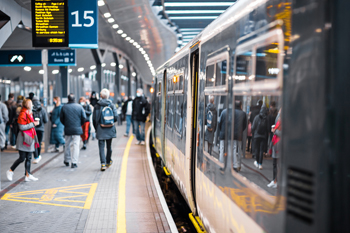Train commuting is at just 33% of pre-pandemic levels, latest industry figures show, prompting fears of a potential hammer blow to the high street and a rise in traffic jams across the country.
Industry body, the Rail Delivery Group (RDG) said research by WPI Economics on its behalf found a 20% shift from rail to road would lead to 300 million extra hours of traffic congestion, adding that train commuters spend a total of £30bn per year in city centres and high streets.

London Bridge station, February 2021
The shift to extra vehicle traffic would see the West Midlands (5 million hours), Greater Manchester (4 million) and West Yorkshire (4 million) as the worst affected city regions outside London (169 million).
This would also create an estimated one million extra tonnes of CO2 emissions per year – the same amount produced by all activity in Swansea in 2019, RDG said.
The group said it could take years to return to the rail passenger numbers seen in 2019. Meanwhile government data shows that the number of car journeys has almost reached pre-pandemic levels at around 96% but the overall number of people taking train trips is still lagging behind at around 60%.
Linking the potential end of the five-day commuting week to the decline of high street retail, RDG highlighted that train commuters travelling to city centres spend on average, £12 on food and drink, £8 on shopping and £6 on entertainment and culture on each journey.
Pre-pandemic, this totalled a £30bn a year boost for local businesses from train commuters.
Let’s get back on track
To encourage more people to take the train, the rail industry is running its biggest national marketing campaign in a generation, under the strapline ‘Let’s get back on track’.
Operators are also working to ensure trains are well ventilated 'with eight out of 10 carriages having systems that refresh the air every six to nine minutes', RDG said. There is also more information about how busy trains are so that people can avoid the busiest times.
However an attempt to win back more passengers with new Flexi Season tickets fell flat earlier this year after it was found the carnet-style tickets could offer discounts as low as 10% compared to peak-time daily tickets.
Andy Bagnall, director general of the Rail Delivery Group, said: 'For many former Monday to Friday commuters the future is undoubtedly going to be a mix of home and office working but the extent to which people return to the workplace and whether or not they take the train to get there is going to be crucial.
'When people take the train it’s more than a journey - it will impact the future of thousands of small businesses, local air quality and the government’s net zero ambitions.
'We want to ensure that returning commuters get the best deal and new Flexi Seasons are a good start, but we also want to work with government on extending tap-in, tap-out pay-as-you-go to major cities beyond the capital so that people know they are always paying the best price.'
Andrew Carter, chief executive of Centre for Cities, said: 'Congestion from cars causes both economic and health problems: Pre-Covid, more than one in 19 deaths in UK cities and large towns were related to long-term exposure to air pollution. So, it is now vital that people change how they get around.
'Centre for Cities has previously called on city leaders to introduce congestion charging and clean air zones to encourage people out of their cars and onto public transport. As we emerge from the pandemic, they should push ahead with this policy.'
Register now for full access
Register just once to get unrestricted, real-time coverage of the issues and challenges facing UK transport and highways engineers.
Full website content includes the latest news, exclusive commentary from leading industry figures and detailed topical analysis of the highways, transportation, environment and place-shaping sectors.
Use the link below to register your details for full, free access.
Already a registered? Login